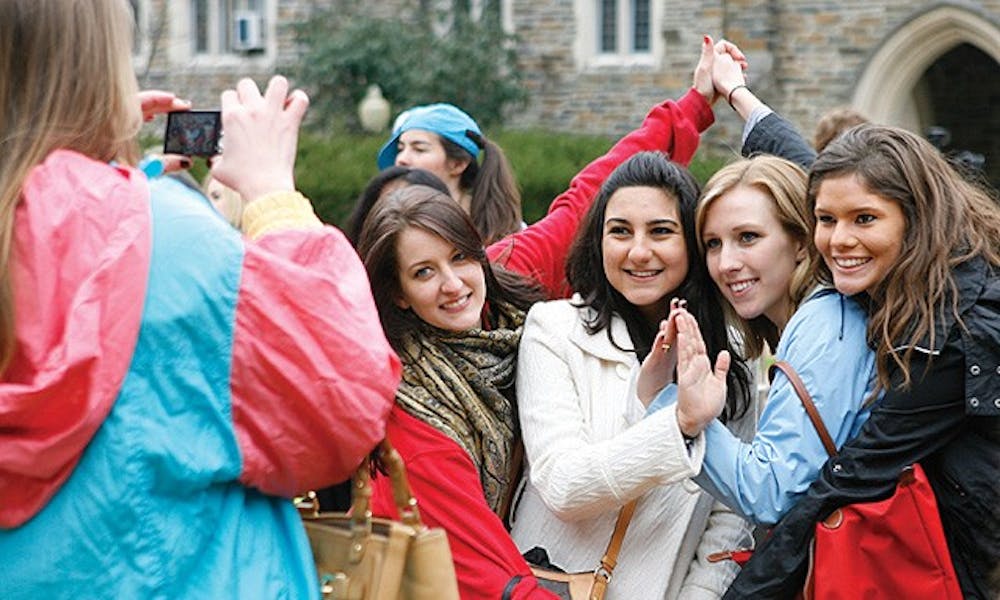With about one-third of Duke's undergraduate population involved in Greek life, sororities and fraternities have long been a significant part of Duke. Students hoping to be part of the action must go through the rush process, consisting of numerous activities and events until finally receiving a bid to join an organization.
Panhellenic recruitment will be entirely virtual and held Sept. 9 to 12 and Sept. 17 to 19. Duke Interfraternity Council recruitment will be a hybrid of in-person and virtual events, which began Wednesday and will end Sept. 14.
Events with over 50 attendees must be either outside or virtual, per Duke’s new policy announced Aug. 30.
National Pan-Hellenic Council—an umbrella of historically Black sororities and fraternities—and Multicultural Greek Council organizations will follow similar guidelines and recommendations, according to Shruti Desai, associate vice president of student affairs for campus life.
"Office of Student Leadership staff work closely with all recognized fraternity & sorority chapters on their event planning, related to intake/recruitment and otherwise," Desai added.
While some students are excited to join a community, others are wary of some of the prominent features of Greek life.
Sophomore Zoe Ali plans to rush to test the waters and see what the experience would entail.
“I’m really weary about some of the inadvertently classist habits there have been in previous years of rush, so as someone who’s fully funding their own college experience it’s definitely a reservation I have,” Ali said.
Sophomore Rhiannon Eplett is also entering the rush process feeling apprehensive. Eplett cites her concern as a recognition that “the outcome is almost entirely out of my control.”
As a Potential New Member without family ties to Greek life, Eplett is curious about the process and realizes that “rushing a sorority or really any type of SLG is a once in a lifetime opportunity. There will never be another time in our lives where you have the chance to join this type or organization where its purpose is almost entirely social.”
“After a year that was really isolating and difficult, I am still looking for a really developed sense of community on campus with no question of whether or not I belong, a whole bunch of new friendships, and a pre-organized social calendar,” Eplett said. “And if I can’t see myself finding those things at the end of the next two weekends with any of the chapters on campus, then I’ll skip out on committing.”
First-years, who are not eligible to partake in selective living group recruitment according to University policy, had a variety of opinions on the process.
First-year Sydney Chen believes that leaders of a sorority are more at fault than sororities as a system for things like drinking.
“Drinking can be one of [the problems], I think it’s up to the leadership to determine that, to regulate that. It’s up to them. They have to take the responsibilities,” Chen said.
While Chen does not plan to rush any of the sororities, she believes there are pros and cons to Greek life.
“It’s the community they bring,” Chen said. “But the rushing process can be a little depressing for those who don’t get in.”
While some students see sororities as a positive way to build community on campus, organizations like Abolish Duke IFC and Panhel have voiced criticism towards Greek life.
Chen disagrees with the idea of abolishing Greek life at the University and says that Greek life creates communities for kids who are struggling to find friends.
First-year Joey Ilagan agreed with Chen and found the possibility of abolishing Greek life to be a “long shot.”
First-year Ashley Chaionn similarly found the Abolish movement’s goals as “a little too extreme” and found they should be held against higher standards of conduct.
“If you violate X amount of certain things, you don’t adhere to this amount of rules, let this amount of people in, then you shouldn’t be able to operate under Duke,” Chaionn said.
Nevertheless, Ilagan says that he finds it permissible to advocate for change, especially in terms of pandemic protocol.
“It’s a plain fact that they were a hotspot for COVID,” Ilagan said. “It’s still a current threat.”
Ilagan, however, says that he still hopes to join a fraternity in the future and finds sororities to be worth the experience.
“I think they can be wonderful organizations,” Ilagan said. “But of course they do have some problems.”
While Chaionn has not formally rushed a Greek organization, she compared the rush experience to her experience rushing business pre-professional society Scale and Coin.
“I think [rushing processes] are good for meeting new people and being able to socialize with people of similar interests,” Chaionn said. “At least for me I was never in a position where I was uncomfortable with anything.”
Chaionn also acknowledges that certain problems exist with “more traditional sororities.”
“Especially since a lot of those tend to be geared towards excluding certain members of certain communities, I think that’s a big problem,” Chaionn said.
Get The Chronicle straight to your inbox
Signup for our weekly newsletter. Cancel at any time.

